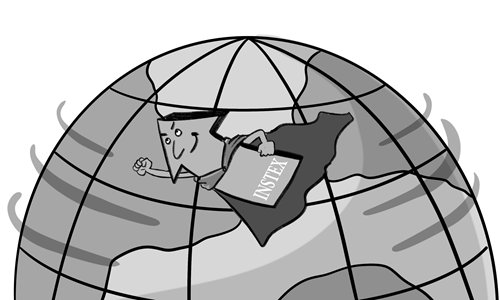HOME >> BUSINESS
New transaction channel with Iran bypassing US sanctions has bright prospects
By Zhao Changhui Source:Global Times Published: 2019/8/5 21:28:40

Illustration: Luo Xuan/GT
The new EU-initiated settlement system with Iran, the Instrument in Support of Trade Exchanges (INSTEX), has officially completed its first transaction.
As a special-purpose vehicle, INSTEX was initiated by Germany, France, and the UK to maintain the Iranian nuclear deal. The countries plan to use this mechanism to simplify financial remittances between European economies and Iran, conduct non-US currency trade with Tehran while bypassing US sanctions.
Can this new global settlement system break the "financial hegemony" the US has achieved through its dollar system?
INSTEX did not suddenly appear from out of nowhere. As an EU project, it has received commitment and support from the organization. When the foreign ministers of Germany, France and the UK first announced the project's launch on January 31, EU High Representative for Foreign Affairs and Security Policy Federica Mogherini welcomed the registration in a statement.
There remains a long way to go before the new system will play its expected role. So far, at least 10 EU countries have joined INSTEX for transaction settlements in the medical and agricultural sectors.
The system will involve more countries and incorporate multiple commodities, including oil and gas necessities.
The system was implemented to maintain the Iran nuclear deal, and the Middle Eastern country's core concern is that its international oil sales are not impeded.
However, the system is not only for Iran. It will gradually become fully-fledged and is expected to become the third-largest international clearing system behind the US dollar and the yuan-denomination systems.
The US dollar, the yuan and euro systems correspond to the three economies of the US, China, and Europe, which are above $10 trillion in size. They have major world responsibilities and are deeply concerned about the future world order.
The US has been using its dollar-clearing system to impose financial sanctions on other countries. In the past two years, the US has implemented its "long-arm jurisdiction" on other countries and enterprises with its domestic laws, something even their European allies can hardly tolerate.
In this regard, is INSTEX a direct reflection of today's world power structure?
Where business is concerned, the three systems serve as the three major navigation satellite systems - GPS, Galileo and Beidou Navigation Satellite System. They are complementary while simultaneously they compete with one another.
INSTEX must remain an open system to achieve long-term development. China and Russia may also consider joining when the time is right.
It is conceivable that all national or corporate players willing to adopt euro-denominated trade, specifically euro activities, would turn to INSTEX.
INSTEX's growth and development requires certain conditions, such as political will from the EU, strong and lasting economic impact, concerted and unremitting efforts, and customer-friendly technical capabilities.
The fourth point is important among these four principles as it involves market acceptance, which is related to the system's success.
It means INSTEX would not replace the global banking industry, just like the latter cannot stop the cross-border payment system from gaining its business.
The developments of the new world order have entered a new stage without road signs ahead, but it will either complete its final form in a peaceful or turbulent way.
During this process, China must broaden its horizons and interact closely with Europe instead of always staring at the US.
The author is a member of the council of the London-based International Institute for Strategic Studies. bizopinion@globaltimes.com.cn
Posted in: EXPERT ASSESSMENT